Unbreakable Bonds: An Injured Veteran Family’s Journey of Sacrifice, Service, and the Healing Power of Hope
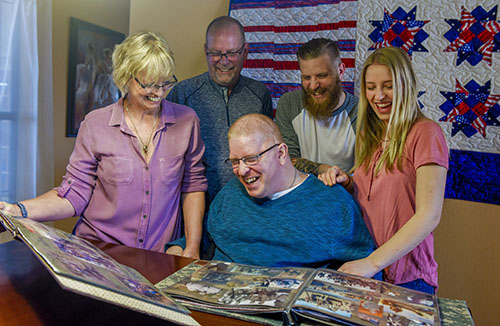
“I joined the Army.”
Christine Schei couldn’t believe her ears when she heard her son say those words. She couldn’t hide her heartbreak. It’s not that Christine didn’t believe in military service. She absolutely did. Her husband served nine years in the military. Her older son, Erik, was a decorated combat soldier who served in the Army. However, it was Erik’s service and the injuries he returned home with that made her heart sink when her younger son Deven told her he’d signed up for the Army.
“They teach you about dying in the military, but nobody tells you how to live with the injuries,” Christine said.
After high school, Erik knew he didn’t want to go to college, so he followed in his father’s footsteps, joining the military and serving as a combat engineer. When Erik left for the Army in 2002, he was 18 years old, just starting his adult life, with the hopes and dreams most 18-year-olds have – a career, a family, traveling.
At just 21 years old, all of Erik’s dreams and the hopes his parents had for him changed forever. Erik was shot in the head by a sniper during his second deployment to Iraq. He was the sniper’s first and only target. Erik survived that shooting – barely. But the traumatic injury to his brain forced him into a wheelchair, barely able to speak or move. He requires constant care.
Christine didn’t know how she could deal with something like that again. But she always supported her children, and that wasn’t about to change.
“After sitting on it for a while, I said, you know what? He's an adult, and if this is what he wants to do. I can't make him feel bad,” she said about Deven’s decision. “I had to support him even though my heart wasn't in it. But I knew emotionally he needed that support and that pat on the shoulder saying it was OK. But it was hard.”
For Deven, the decision to join wasn’t hard. Before Erik left for Iraq, he had promised his brother that if anything happened to him when he was overseas, Deven would pick up the mantle and finish what Erik started.
“I knew [my parents] would be upset, but I was more worried about my brother because he wasn’t 100% sure about it.” Deven said. "We cried it out and had a heart-to-heart. I felt like it was the best decision I made.”
How a Devastating Injury Led to a Life-Changing Decision
Like many working moms, Christine had to balance family and work. When Erik joined the Army in 2002, Deven was 15, and Christine and her husband Gordon also had a toddler, Anneka, at home.
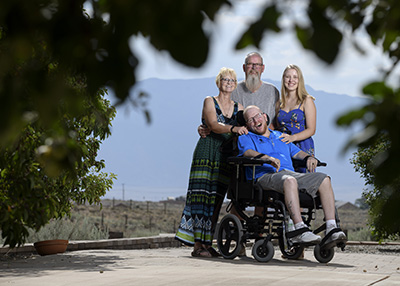
Christine couldn’t have foreseen the path her life would take just a few years later. In October 2005, Christine and Gordon got the call. Erik had been shot in the head. He needed emergency surgery to remove half his skull to accommodate the swelling in his brain. Survival was unlikely, they were told. But Erik did survive, and once he was stabilized, he was flown to Walter Reed Medical Center in Washington, DC, where Christine and Gordon would finally get to see their firstborn.
When they entered his room, Erik’s head was covered in bandages. Tubes were everywhere. His eyes were closed. His body was still. He didn’t respond to touch. Doctors told Christine and Gordon that Erik would never be the same. That he would be in a vegetative state for the rest of his life. They talked about unplugging the machines that were keeping him alive. But Christine’s faith and a sign she got at the hospital chapel told her what to do. Like Erik, they would keep on fighting.
Independence Program Provides Helping Hand
It was during her time with Erik at Walter Reed that Christine was first introduced to Wounded Warrior Project® (WWP). At the time, WWP was delivering backpacks filled with comfort items to service members injured in Iraq and Afghanistan. Throughout WWP’s 20-year history, its programs and services evolved to offer the Schei family support during every step of their journey.
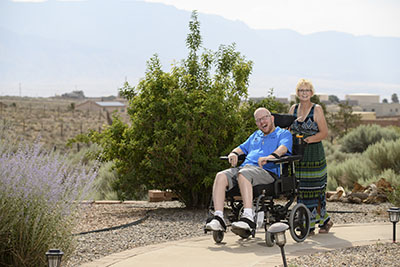
Christine got Erik involved in WWP’s Independence Program, which provides innovative, long-term support to the most catastrophically wounded veterans.
The program helps Erik connect to others outside of his family and find ways for him to engage in new hobbies and interests.
“They do a ton of stuff for Erik,” Christine said. “He has music therapy every week. I take him because Erik loves music, and he listens to music all the time. They also found a recreational service that does a variety of stuff, from art to movies, so he’s able to get out of the house.”
“Erik loves it because it gets him away from us,” Christine joked.
WWP has also enabled Christine to connect with other caregivers and family members and get some much-needed respite time. She’s been able to attend caregiver retreats, including one for caregivers with children who have severe brain injuries.
“We shared and hugged and compared information,” Christine said. “We understood where everybody was coming from.”
Find out how WWP has served warriors and their families for 20 years.
Another Devastating Phone Call
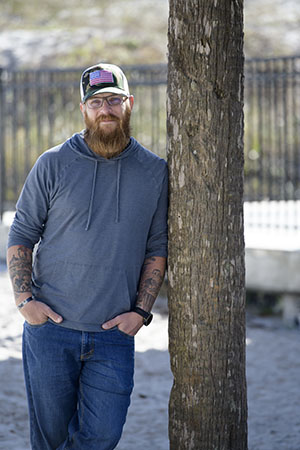
Connecting with WWP helped Christine adapt to her new life as a caregiver. Still, nothing could minimize her fears when Deven joined the Army after Erik’s injuries. Although she decided to support his decision, it didn’t stop her from worrying, especially when Deven was deployed to Afghanistan in May 2010.
Two months later, in July, she once again got a call letting her know her son had been injured in combat. This time, though, the call came from Deven himself.
“As soon as I picked up the phone, I could hear the pain in his voice,” Christine said.
Despite the fear and concern, Christine was just relieved to hear his voice. Erik hadn’t been able to call himself. She had to hear about Erik’s injury from a stranger.
“It’s bad,” Deven told his mom. Deven and other members of his 101st Airborne Air Assault Division unit were ambushed. Deven was seriously wounded, losing a portion of his leg, and had shrapnel throughout the left side of his body. He wasn’t sure if he would lose his leg.
Deven underwent more than 17 surgeries for multiple injuries. He was also dealing with traumatic brain injury (TBI) and post-traumatic stress disorder (PTSD). But what devastated him most was having to leave the military and his fellow soldiers who were still serving. It all took a toll on Deven, but Christine knew where to turn by that point.
“My mom was in contact with Wounded Warrior Project the whole time,” Deven said.
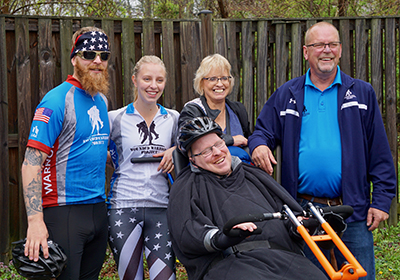
It took Deven a little longer to reach out and get help, though. About a year after his injury, Deven made the life-changing decision to participate in a WWP program.
“I didn’t want to admit that I needed help,” Deven said. "It took me a little while to ask for help, but when I did, it really opened doors for me. It helped keep me from feeling so alone.”
Deven got benefits assistance to help with his VA disability claims. He got employment assistance through Warriors to Work. He attended programs through Warrior Care Network® – a partnership between WWP and four world-renowned academic medical centers – to help combat his PTSD.
One of his biggest highlights, however, was participating in a Soldier Ride with Erik. The brothers rode modified bikes to accommodate their injuries and connected with other wounded warriors.
“Those Soldier Rides I’ll never forget. I have a lot of awesome memories from it,” Deven said.
Along with WWP, Deven credits his wife Kelly, and children Reagan Thomas and Valor Erik, named for his older brother, with helping him find a path forward and live life on his own terms.
Deven also found another way to serve by becoming a spokesperson for WWP and sharing his family's story across the country. He’s seen the impact WWP has had in its 20 years of serving veterans and their families as both a warrior and a spokesperson. He knows personally that the veteran population has unique and continuous needs.
“Warriors are getting out of the service now, and they're aging, so their needs are changing,” Deven said. “I know what I was dealing with in 2012 is very different than what I was dealing with in 2021.”
WWP is committed to supporting warriors like Deven and Erik and their families throughout their lives and for future generations of veterans.
“War is always going to be there. It’s always a possibility,” Deven said. “We need to stay ahead of it. Wounded Warrior Project needs to be there, and it can’t do that without support.”
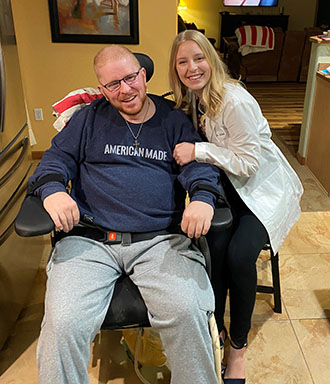
Planning for the Future
It’s an uncomfortable topic, but Christine believes in being prepared, so talking about aging and death is important. She knows there will come a time when she and Gordon won’t be there or won’t be physically able to care for Erik anymore.
“We're working on this right now diligently, so we have everything in place in case something happens to us,” Christine said. “We’re doing the financial planning and anything that we need to make sure Erik has what he needs once we're gone.”
Through WWP’s Independence Program Continuous Care Services, families like Christine’s can plan for the long term in the event of a caregiver loss or separation. The program is designed to ensure severely wounded veterans like Erik can remain in a surrounding that allows for as much independence as possible with the highest-quality care.
“It’s a huge burden off our shoulders,” Christine said. That they help us to make it as easy as possible in case we're not there makes a big difference.”
Finding a New Normal
Erik will never be the same Erik he was when he joined the Army. He will need help for the rest of his life. Christine still mourns the son she used to have but also appreciates and admires the son she has now.

Deven also had to come to terms with having a different relationship with his brother than he did when they were younger. Their bond is still very much there, even though it’s changed significantly.
“I lost my brother the day he got shot,” Deven said. “I still have a hard time because I saw him in a different light. But I am close with Erik in a different way now.”
Christine said she has seen such improvement in Erik over the last 18 years. Although he’ll always need a caregiver, she prefers to focus on his abilities and accomplishments.
“He has a great sense of humor,” she said. “He has a big old smile on his face when he wakes up. He's positive. He's entertaining. He is inspirational. All the things that are really important."
He’s also not the same Erik he was in the initial aftermath of his injury. He embraces the life he has now in a different way. He has a computer with technology that can calibrate his eye movement to operate a keyboard, allowing him to play online games, engage on social media, and text his siblings. He still loves watching horror movies and listening to rap music. He loves baking, which he accomplishes by reading recipes to his mom and overseeing the process.
“He’s the supervisor,” Christine said. “He thinks that’s hilarious.”
The Scheis continue to find ways to serve. Christine and Gordon advocate for wounded veterans and caregivers. Deven is sharing his story to encourage other veterans to reach out for help. Erik and Deven’s little sister Anneka, inspired by her brothers to join the medical field, is now a nurse in a cardiac unit at a hospital.
And perhaps Erik’s biggest service is how he continues to inspire his family and others.
“He puts life in focus,” Christine said. “That’s his new purpose. Being an inspiration to other people to put their lives in perspective.”
Find out how you can support wounded warriors.
Contact: — Paris Moulden, Public Relations, pmoulden@woundedwarriorproject.org, 904.570.7910
About Wounded Warrior Project
Since 2003, Wounded Warrior Project® (WWP) has been meeting the growing needs of warriors, their families, and caregivers — helping them achieve their highest ambition. Learn more.